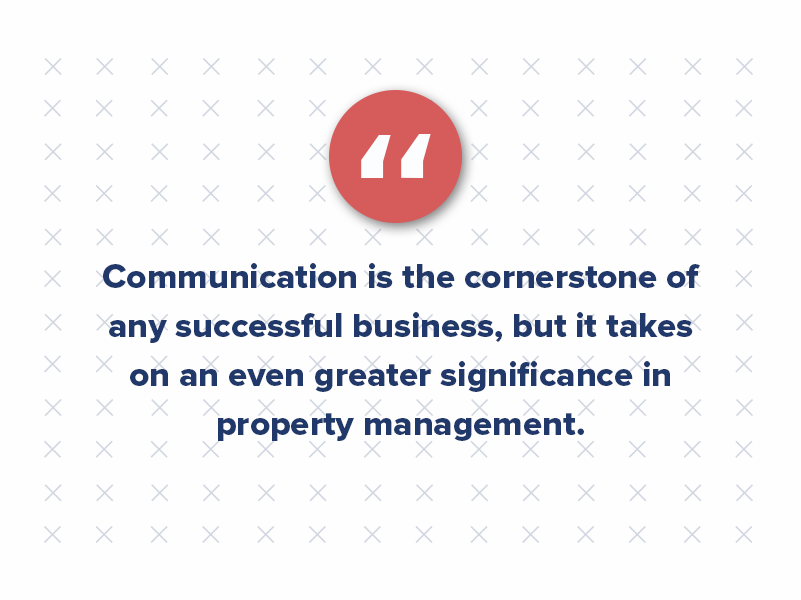Expert Tips to Avoid Property Management Nightmares
The life of a property manager is a juggling act. You’re responsible for everything from resident relations and maintenance to budgeting and legal compliance. It’s no wonder that mistakes can happen, especially for new property managers or those managing a growing portfolio.
The good news is that by identifying common pitfalls, you can take proactive steps to avoid them.
Here’s a look at some of the biggest mistakes property managers make, along with actionable tips to keep your properties running smoothly:
1. Failing to Properly Screen Residents
A bad resident can be a nightmare for any property manager. They can damage the property, disrupt other residents, and drain your time and resources.
The fix? Implement a thorough screening process that includes credit checks, rental history verification, employment verification, and reference checks. Don’t skip this crucial step — a bad resident can cost you far more in the long run than a thorough screening process ever will.

2. Not Having Clear Lease Agreements
A well-written lease agreement protects both you and your residents. It should clearly outline the rights and responsibilities of both parties, including rent amount, due dates, late fees, pet policies, maintenance procedures, and termination clauses.
The fix? Use a standardized lease agreement that has been reviewed by a lawyer. Keep it updated with any local or state regulations that may change.
3. Letting Maintenance Requests Pile Up
Prompt and thorough maintenance is a cornerstone of successful property management. Like addressing resident complaints quickly, addressing maintenance requests swiftly is essential to avoid a cascade of negative consequences.
Here’s why prioritizing maintenance is crucial:
- Protecting Your Investment: Regular maintenance plays a vital role in preserving the condition of your properties. Neglecting repairs can lead to further deterioration, decreased property value, and higher operating costs. Think leaky faucets that escalate to water damage or clogged gutters that lead to foundation issues. Addressing minor issues promptly saves you money in the long run.
- Resident Satisfaction & Safety: Living in a well-maintained property contributes significantly to resident satisfaction. Ignoring maintenance requests creates frustration and a sense of neglect. Prioritizing repairs ensures a safe and comfortable living environment for your residents.
- Reduced Liability: Letting maintenance issues linger can expose you to legal trouble. For instance, a slip and fall because of an unaddressed ice patch on the sidewalk could result in a lawsuit. By promptly addressing maintenance requests, you’re mitigating potential liability risks.
Here’s how to ensure your properties are well-maintained:
- Routine Inspections: Schedule regular inspections of your properties to identify potential problems before they become major issues. This could involve monthly walkthroughs or annual comprehensive inspections.
- Qualified Contractors: Develop relationships with qualified and reliable contractors who can handle various maintenance tasks. Verify references to confirm licensure and insurance. Oversee the quality and timeliness of their work to ensure efficient repairs.
- Budgeting for Maintenance: Don’t underestimate the importance of budgeting for maintenance and repairs. Factor in routine maintenance costs and a reserve fund for unexpected emergencies and major repairs. This ensures you have the resources readily available when needed.
- Communication Is Key: Like with resident complaints, keep residents informed throughout the maintenance process. Acknowledge their request promptly, explain the repair timeline, and provide updates if any delays occur. Open communication fosters trust and reduces frustration.

4. Poor Communication With Residents
Communication is the cornerstone of any successful business, but it takes on an even greater significance in property management. You’re constantly juggling interactions with a diverse group — your team members, property owners, residents, and vendors. When communication breaks down, it can lead to misunderstandings, conflicts, delays, errors, and ultimately, dissatisfied customers.
Here’s how to ensure smooth communication:
- Establish Clear Channels: Don’t leave your team and renters guessing how to reach you. Set up designated communication channels — email, phone calls, text messages, or online platforms like resident portals. Consistency is key — don’t make them chase you down across multiple platforms.
- Frequency & Transparency: Aim for frequent, transparent communication. Regular updates keep everyone informed and in the loop. Don’t be afraid to share both good and bad news promptly and honestly.
- Tailored Communication: A one-size-fits-all approach won’t work. Tailor your communication style to your audience. Use clear and concise language with residents, provide detailed reports to property owners, and foster open collaboration with your team.
- Feedback & Listening: Communication is a two-way street. Listen to your team and renters’ concerns, questions, and suggestions. Provide positive and constructive feedback to keep everyone motivated and on track. Respond promptly and professionally, demonstrating that their input is valued.
- Technology Advantage: Fortunately, technology is on your side. Utilizing property management software streamlines communication by centralizing information, automating tasks, and facilitating easy access for all parties involved. This reduces the risk of errors and keeps everyone on the same page, boosting overall efficiency.
- Building Relationships: Effective communication goes beyond simply sharing information. It’s about fostering trust and building strong relationships. Schedule regular team meetings to discuss projects, address concerns, and celebrate successes. Open communication fosters a collaborative environment where everyone feels comfortable contributing their best work.
5. Not Keeping Records and Documents
Failing to organize and store important documents properly can lead to a domino effect of problems, including missing records. Missing or disorganized records can make tracking important information (i.e., lease agreements, maintenance requests, and financial transactions) difficult. This can lead to confusion, errors, and wasted time.
Without clear documentation, disputes with residents over rent payments, security deposits, or repairs can become tangled. Without proper records, you may be unable to defend your position in a legal dispute, potentially resulting in hefty fines or even lawsuits.
Here’s how to ensure your records are organized, secure, and accessible:
- Secure Storage: Utilize a secure and accessible system for storing your records. Cloud-based storage solutions offer convenience and accessibility, while traditional filing cabinets can work for paper documents.
- Regular Review and Updates: Don’t let your records become an archive of forgotten paperwork. Schedule regular reviews to ensure all documents are accurate and up-to-date.
- Compliance With Regulations: Retention laws vary depending on your location. Familiarize yourself with the relevant regulations regarding record keeping and disposal. Understanding these requirements ensures you’re adhering to legal mandates.

Effective record-keeping is a fundamental skill in property management. Most real estate transactions involve a mountain of paperwork — lease agreements, maintenance records, financial statements, and more.
Maintaining electronic copies alongside physical documents is essential in today’s digital age. This allows you to access crucial information even when you’re away from the office, ensuring you can always stay on top of your business.
6. Not Taking Advantage of Technology
Many property management software solutions can streamline your workflow and save you time. These tools can help you with tasks like screening residents, collecting rent online, managing maintenance requests, and generating reports. The fix? Research property management software options and find one that fits your needs and budget. Many offer free trials, so you can test them before committing.
7. Not Marketing Your Properties Effectively
Vacancies cost money. There’s no sugarcoating it. A well-defined multifamily marketing strategy is essential to attract qualified residents and keep your properties occupied.

Don’t put all your eggs in one basket. Utilize a diverse range of multifamily marketing channels to reach your target audience. This could include:
- Online Listings: High-quality listings on popular rental platforms are a must-have. If possible, showcase your properties with professional photos, detailed descriptions, and virtual tours.
- Social Media Marketing: Use social media to connect with potential residents. Share engaging social media posts, run targeted ads, and create a community around your properties.
- Website Presence: A professional website is a valuable asset. It lets you showcase your properties, provide leasing information, and establish your brand identity.
- Offline Strategies: Don’t underestimate the power of traditional methods. Yard signs, local print ads, and partnerships with businesses in your area can still be effective ways to reach potential renters.
While a do-it-yourself approach is possible, managing a comprehensive marketing strategy can be time-consuming, especially as your portfolio grows. This is where partnering with a marketing agency can be a game-changer.
Think of a marketing agency as an extension of your multifamily property team. They can provide a wealth of expertise and resources to help you achieve your marketing goals and increase your bottom line.
Here are just a few of the ways a marketing agency can streamline your marketing efforts:
- Streamlined Marketing Collateral: Ordering eye-catching flyers, brochures, and other marketing materials can be a hassle. Criterion.B offers a one-stop shop for designing and ordering all your promotional needs to save time and ensure brand consistency.
- Actionable Analytics & Reporting: A good marketing agency will leverage analytics tools to track the performance of your marketing campaigns. This data can reveal valuable insights into what’s working and what’s not. They can help you set up and track key metrics like website traffic, lead generation, and conversion rates.
- Search Engine Optimization (SEO): Improving your website’s ranking in search results so potential residents can easily find your listings.
- Email Marketing: Creating targeted email campaigns to nurture leads and connect with potential renters.
- Blogging and Content Creation: Developing engaging content that showcases your properties and attracts qualified leads via a blog post.
- Social Media Management: Creating engaging content and managing interactions with potential residents across all social media channels.
- Branding and Design: Developing a strong brand identity for your property management company, including logo design and website creation.
- Website Development and Management: Building a user-friendly website that showcases your properties and provides a seamless leasing experience.
8. Not Staying Up-to-Date on Industry Trends
The property management industry constantly evolves, with new technologies and regulations emerging. Staying informed is important to ensure your business runs as efficiently and effectively as possible.
The fix? Attend industry conferences, webinars, and workshops. Read industry publications and blogs to stay up-to-date on the latest trends.
Want quick marketing tips and multifamily trends delivered straight to your inbox once a week? Sign up for our weekly email list to stay informed!

9. Ignoring Complaints & Not Focusing on Resident Retention
High resident turnover can be a major drain on your resources. It involves advertising costs of vacant units, showing apartments, screening new renters, and processing paperwork. It can also result in a loss of rental income during vacancy periods. But the hidden costs are even greater — negative reviews, a damaged reputation, and a revolving door of unhappy residents.

Here’s how to cultivate a thriving community that keeps renters happy:
- Treat Renters with Respect: Building positive relationships starts with respect, courtesy, and professionalism. Respond to their needs and concerns promptly and effectively.
- Responsive Complaint Resolution: A well-defined system for handling complaints is essential. This includes a clear process for receiving, recording, and resolving issues. Respond quickly to complaints to explain how you’ll address the problem. Keep residents updated throughout the process, and follow up after the repair.
- Value Feedback and Communication: Open and transparent communication is key. Encourage feedback. Regularly solicit their input through surveys, resident meetings, or suggestion boxes. Actively listen to their concerns and suggestions, demonstrating their input is valued.
- Offer Incentives for Renewals: Show your existing renters how much you appreciate them by offering incentives for lease renewals. This could include discounts on rent, free parking, or waived application fees.
- Create a Sense of Community: Help your residents feel like they belong! Organize fun events, create social media groups for them to connect, or offer amenities that encourage interaction. When residents feel like part of a community, not just renters in a building, they’re more likely to want to renew their leases.
10. Micromanaging Your Team & Not Delegating Tasks
Learning the art of delegation becomes increasingly important as your property management portfolio expands. While you may be tempted to hold onto the reins and meticulously manage every detail yourself, this approach is ultimately unsustainable and can hinder your long-term success.
Micromanaging your team can have several negative consequences. It can stifle their motivation, creativity, and sense of autonomy. Constantly hovering over their shoulders can make them feel like they’re not trusted to do their jobs effectively, decreasing morale and productivity.
The solution lies in empowering your team through effective delegation.
- Delegate Based on Strengths: Analyze your team members’ skills, experience, and interests. Assign tasks that align with their strengths and allow them to develop new skills.
- Trust and Autonomy: Once you’ve delegated a task, trust your team to complete it without your constant oversight. Micromanaging every step is a recipe for frustration and resentment.
- Support and Resources: Provide your team with the necessary resources for success, such as training materials, software tools, and clear guidelines.
- Coaching for Growth: Don’t hesitate to offer guidance and support as needed. Regular check-ins and constructive feedback can help your team members grow in their roles.

Often, managers who micromanage their teams worry their employees aren’t doing a good job. If you don’t communicate well with your team or can’t motivate them, they might not feel like doing their best work. Instead of hovering over them, invest in becoming a better leader. Learn how to communicate clearly and build a team environment where everyone feels trusted and responsible for their work.
Remember, you hired your team for a reason — you believe in their skills and potential. Start by delegating smaller projects that allow them to demonstrate their capabilities. As they gain confidence and experience, gradually increase their scope of responsibility. If they hit a roadblock, provide coaching and support to help them develop the skills they need to reach the next level.




